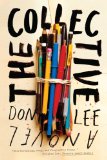Summary | Excerpt | Reading Guide | Reviews | Beyond the book | Read-Alikes | Genres & Themes | Author Bio

A Novel
by Don LeeDon Lee's struggles as a Korean American author seem to mirror those of other "hyphenated Americans," trying to break free of molds often defined by stereotypes of their nationalities. In an age where "post-racial" has become a buzzword, why does it still seem important for authors of certain stripes to strictly color within the lines? Should an author of mixed heritage write only about the immigrant experience?
To answer these questions, or at least to begin a discussion, Lee features the lives of three Asian American artists in his novel The Collective. The narrator, Eric Cho, is a third-generation Korean American who grew up in Mission Viejo, California, largely free from any discrimination that he could notice. The driver of the story, Joshua Yoon (Meer) is a "1.5" - a Korean American adoptee born in South Korea and brought up by two Jewish professors in Cambridge, Massachusetts. Finally, there's second-generation Taiwanese American Jessica Tsai who bears the weight of her immigrant parents' expectations when she attends Macalaster College in St. Paul, Minnesota in 1988.
While at college, the three artists are thrown together and become close friends. Josh and Eric want to be writers while Jessica is looking to become a visual artist, and they loosely form a group that Josh christens the 3AC - the Asian American Artists Collective. The novel follows the trio as they move on to their adult lives in Cambridge, and Lee does a fantastic job of detailing their everyday adventures in Massachusetts - the sights and sounds of the city come alive in the telling. (However, a word of caution: There are some strong sexual themes in the book, and while they don't smother the story arc, they might make some readers squeamish.)
Where Lee especially shines is in addressing all manner of existential questions. It would not be a reveal to say that Joshua Yoon commits suicide - this forms the book's first chapter, and the rest of the novel essentially traces his path down to it. In analyzing the intersection of race and art, Lee brings to the fore wonderful analyses of both - "I didn't know what it meant to be Korean, or Asian, or Asian American. I only felt American," says Cho, who serves as the narrator of the novel. The Collective is also a fantastic meditation on the nature of art and what it should represent. The author uses a quote by Kafka to make a strong point here: "Art's not about being didactic. There's nothing more boring or tedious than art. Art should simply be about what makes us human. Its only obligation, if anything, is to break the frozen sea within us."
Lee achingly describes the compromises we make when we reach middle age. How long should one be a starving artist? Is it that bad to crave occasional creature comforts? "Youth is about promise. As you approach your forties, it's about how you've come up short of those dreams, and your life becomes what you do with that recognition," says Cho, now 41.
Lee, who is in his early 50s, has said that the novel is not autobiographical even if he can identify with Joshua's disposition - morose, prone to depression, and pessimistic by nature. It is apparent, however, that The Collective served as a great release for Lee's contemplative temperament - you can almost see him take every side in every philosophical issue that comes up.
Lee has also mentioned that he wants to shed light on how Asian Americans wrestle internally with race. Sometimes The Collective wears this agenda on its sleeve too readily, but it serves as a must-read for everyone interested in the discussion of racial identity and its place in our supposedly post-racial world. Even if these issues can be addressed internally within an individual race, even if a minority artist can move beyond the confines dictated by the stereotypes of his racial identity, one question still looms large: Will society as a whole welcome it? Coming from a gifted writer like Lee, the answer, we hope, will most definitely be yes.
![]() This review was originally published in The BookBrowse Review in August 2012, and has been updated for the
July 2013 edition.
Click here to go to this issue.
This review was originally published in The BookBrowse Review in August 2012, and has been updated for the
July 2013 edition.
Click here to go to this issue.

If you liked The Collective, try these:

by R O. Kwon
Published 2025
From bestselling author R. O. Kwon, an exhilarating, blazing-hot novel about a woman caught between her desires and her life.

by Fredrik Backman
Published 2025
#1 New York Times bestselling author Fredrik Backman returns with an unforgettably funny, deeply moving tale of four teenagers whose friendship creates a bond so powerful that it changes a complete stranger's life twenty-five years later.
Your guide toexceptional books
BookBrowse seeks out and recommends the best in contemporary fiction and nonfiction—books that not only engage and entertain but also deepen our understanding of ourselves and the world around us.